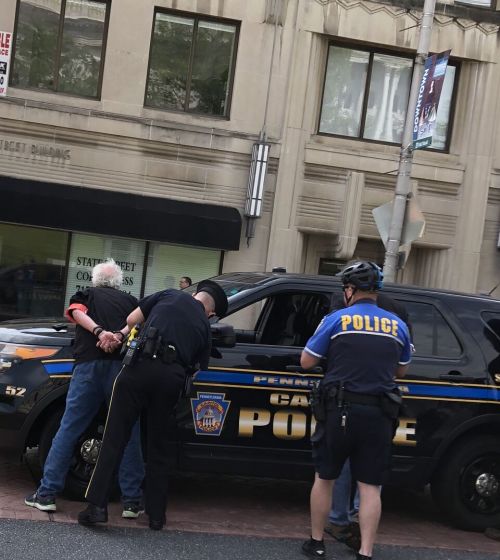Last Word | June 6th, 2018

Gary Olson
olsong@moravian.edu
“Rev. William Barber is the closest thing to Dr. Martin Luther King Jr. that we have in our midst.”
- Prof. Cornell West on the Poor People’s Campaign Co-Founder, Rev. William Barber
Recently, I was privileged to be among the thirteen people arrested for civil disobedience at the first Poor People’s Campaign (PPC) rally at our state capitol building in Harrisburg, PA. The campaign, modeled on Dr. Martin Luther King’s original movement from 50 years ago, will continue every Monday at state capitals in 37 states, culminating in a national mobilization in late-June at the nation’s capital in Washington, D.C. Two remarkable faith leaders, Rev. Dr. Liz Theoharis and Rev. Dr William Barber are the co-chairs of this new multi-issue, multi-racial campaign. It’s non-partisan and no politicians are allowed on the platform.
The primary reason I joined the Poor People’s Campaign and encouraged others to do so, is because of its potential for realizing desperately needed structural changes in our country. Poverty is one example: 43 million Americans remain inshared poverty and numerically, whites make up the largest share (17.3 million) followed by African-Americans (9.2 million) and Latinos (11.1 million). In addition, some 140 million Americans are classified as low-income. These are the working poor employed at low-wage, part-time jobs. After carefully documenting the bleak conditions confronting the poor in this country, a report by the United Nations concluded that extreme wealth and the persistence of severe poverty in a rich country like the United States “is a political choice made by those in power” and with “political will, it could be readily eliminated.” The PPC is dedicated to midwifing this change.
My personal experience with the PPC has been overwhelmingly positive and inspiring. Its hallmarks include dynamic leadership, superb organizational skills, a widely diverse membership and high morale. I’ve also felt a part of MLK’s “beloved community“ when interacting with the members. The activist and writer Patrick Walker asserts that “We need to articulate the moral foundations of our political positions” and this declaration is emblematic of the campaign.
The PPC is tantalizingly close to taking, for me at least, the next logical step for reaching its potential. That is, in addition to its powerful moral message, a need exists to be more explicit about how the class and power structure of capitalism is inextricably linked to the PPC’s “Four Evils” of systemic racism, systemic poverty, ecological devastation and the cost of America’s war economy. It’s not disparaging to either approach to advocate combining faith-based motives with a fact-based, political economy diagnosis of the problem. This symbiotic fusion would provide a formidable tool for advancing the PPC’s objectives.
Some folks, at least initially, might be uncomfortable with linking faith and justice motives and a radical political analysis but speaking truths about power is entirely in keeping with Martin Luther King’s own political evolution. In 1966, when talking to his staff, King offered some positive words about democratic socialism and then said, ”You’re really getting on dangerous ground here because you’re messing around with the folks. You are messing around with the captains of industry.” Two years later, in an interview with a NYT’s reporter, King said “In a sense you could say we‘re involved with class struggle...” This is why J. Edgar Hoover described King as “the most dangerous man in America.”
Jared Ball, writing for the Black Agenda Report described how King’s image has been sanitized (in Cornell West’s phrase, “the Santa Clausification“ of King) when powerful forces came together “...to ensure that King would be separated from his anti-capitalist, anti-imperialist and patient work for a genuine revolution.” During months leading up to his assassination, King was unwilling to cite only the symptoms without identifying the cause. He began publicly connecting all the dots and he’d be doing so today. The title of Dr. King’s last book was “Where Do We Go From Here?” I’m suggesting that the PPC’s enormous transformative capacity can be the answer.
[Editor’s note: Gary Olson is Professor Emeritus of Political Science at Moravian College, Bethlehem, PA. He grew up in Fargo.]
January 15th 2026
January 15th 2026
December 18th 2025
November 18th 2025
September 23rd 2025
_(1)_(1)_(1)_(1)_(1)__293px-wide.jpg)
__293px-wide.jpg)
_(1)_(1)_(1)_(1)_(1)__293px-wide.jpg)
__293px-wide.png)

